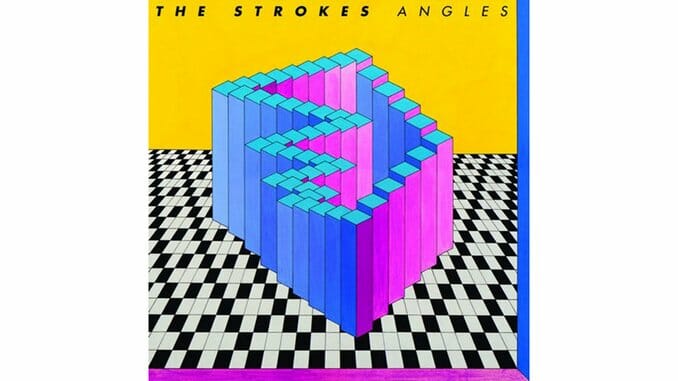
I never thought I’d be making this statement about a Strokes record, but the New York band’s fourth album is packed with surprises. Sure, the defining formal fundaments remain: the highly stylized, hermetic sound; the obsessively vacuum-packed rhythm tracks of drummer Fab Moretti and bassist Nikolai Fraiture; the meticulous guitar interplay of Nick Valenzi and Albert Hammond Jr.; Julian Casablancas’ detached, vampire-nocturnal vocals. But atop this aural/stylistic architecture, the band proceeds to toss one lively curveball after another, resulting in an engagingly eclectic, improbably upbeat stack of tracks.
The process that led to Angles was unlike anything the Strokes had previously experienced, and it included some speedbumps along the way. The initial sessions took place at Avatar Studios in Midtown Manhattan with veteran producer Joe Chiccarelli (My Morning Jacket, the Shins), whose specialty is capturing full-band performances live off the floor. But the band found the results of those audio verite sessions unsatisfactory. “It just sounded boring,” guitarist Albert Hammond Jr. recently told the New York Times. The band then headed upstate to Hammond’s place to give the material another run-through with producer Gus Oberg. The 10 tracks that made the cut are drawn primarily from these later sessions, though the band retained some of the work done with Chiccarelli, presumably tweaked to some degree.
Even more significantly, the writing and arrangements weren’t created by Casablancas as before, but instead sprang out of collaborative efforts among the other four bandmembers while the frontman was touring behind his 2009 solo LP Phrazes for the Young; he subsequently laid his own ideas over the top of what had already been created. “I think ‘collaboration Strokes’ is more on the side of just poppy than what I am interested in personally,” Casablancas told the New York Times (though he admitted he’d made no modifications to 60% of the work the band had delivered to him).
As it turns out, his compromise is the listener’s pleasure. The album unfolds in a disarmingly “poppy” way, set off by a couple of noir-ish, more self-conscious art pieces closer to Phrazes for the Young in the laser-like “You’re So Right” and the slinky “Metabolism.” Interestingly, the most immediately appealing cuts are the four that survived from the Chiccarelli sessions: the Is This It?-referencing first single “Under Cover of Darkness,” the exuberant “Gratisfaction” and a pair of songs that would’ve fit nicely on any of the Cars’ early LPs, the chromed-out “Two Kinds of Happiness” and the rock nocturne “Life Is Simple in the Moonlight,” which closes the album on an expansively romantic note—an unequivocal first for this tres chic posse. If anything on the upcoming Cars reunion album is as strong as these two songs, it’ll be hailed as a full-on return to form.
Appropriating classic grooves is nothing new for the Strokes, dating back to their archetypal 2001 single “Last Nite,” which borrowed the high-revving power plant of Tom Petty and the Heartbreakers’ “American Girl.” Here on Angles, they lift blatantly and gleefully—the faux-reggae rhythm of Men at Work’s “Down Under,” of all things, on opener “Machu Picchu,” Thin Lizzy’s “The Boys Are Back in Town” on “Gratisfaction,” the aforementioned, impeccably-crafted Cars remodels and practically the entirety of early-’80s synthpop on the New Wave homage “Games.” That the band is able to so deftly snap together its own quirky sonics atop each of these borrowings is one of the album’s defining delights.
The chunky rocker “Taken for a Fool,” recorded later, is of a piece with the Chiccarelli-initiated tracks, and these five — no less than half of the new record — are as welcoming and companionable as anything the Strokes have ever released. So is the LP’s most radical change of pace, “Call Me Back,” on which Casablancas turns over a new leaf, singing tenderly over a fingerpicked electric guitar, later joined by what sound like muted strings, on what comes off as a postmodern lullaby.
There aren’t many instantly identifiable bands that can mess with the familiar recipe while somehow also honoring it, but that’s precisely what the Strokes have achieved on Angles, an album as warm as it is cool.